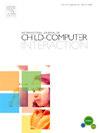Spatial adventure: An augmented reality system for children's spatial skills training
Q1 Social Sciences
International Journal of Child-Computer Interaction
Pub Date : 2025-09-23
DOI:10.1016/j.ijcci.2025.100783
引用次数: 0
Abstract
Spatial ability is recognized as an important component of children's intelligence and plays an important role in all areas. Despite the importance and potential utility of spatial ability for children, the development of spatial ability within the primary classroom has often been neglected. Moreover, little research has been conducted to propose a systematic theoretical model for intervention training of children's spatial abilities. In addition, many of the current spatial ability trainings mainly rely on two-dimensional visual space, and there is still a need to further expand the design of intervention systems in three-dimensional visual space. In this paper, we explore a spatial cognition intervention method for children based on augmented reality technology, and design and develop an implementation of this approach in a system we call Spatial Adventure. Containing five major game levels, it comprehensively covers the training content of five spatial sub-elements: mental rotation, spatial relations, spatial visualization, spatial perception, and spatial orientation. Finally, the effectiveness of this method on children's spatial ability enhancement is verified through experiments.
空间冒险:儿童空间技能训练的增强现实系统
空间能力被认为是儿童智力的重要组成部分,在各个领域都发挥着重要作用。尽管空间能力对儿童的重要性和潜在效用,但在小学课堂中空间能力的发展往往被忽视。此外,对儿童空间能力干预训练的系统理论模型研究较少。此外,目前很多空间能力训练主要依赖于二维视觉空间,三维视觉空间干预系统的设计还需要进一步拓展。在本文中,我们探索了一种基于增强现实技术的儿童空间认知干预方法,并设计和开发了一种在我们称为空间冒险的系统中实现该方法的方法。包含五大游戏关卡,全面涵盖了心理旋转、空间关系、空间可视化、空间感知、空间定向五个空间子元素的训练内容。最后,通过实验验证了该方法对儿童空间能力增强的有效性。
本文章由计算机程序翻译,如有差异,请以英文原文为准。
求助全文
约1分钟内获得全文
求助全文
来源期刊

International Journal of Child-Computer Interaction
Social Sciences-Education
CiteScore
7.20
自引率
0.00%
发文量
73
 求助内容:
求助内容: 应助结果提醒方式:
应助结果提醒方式:


